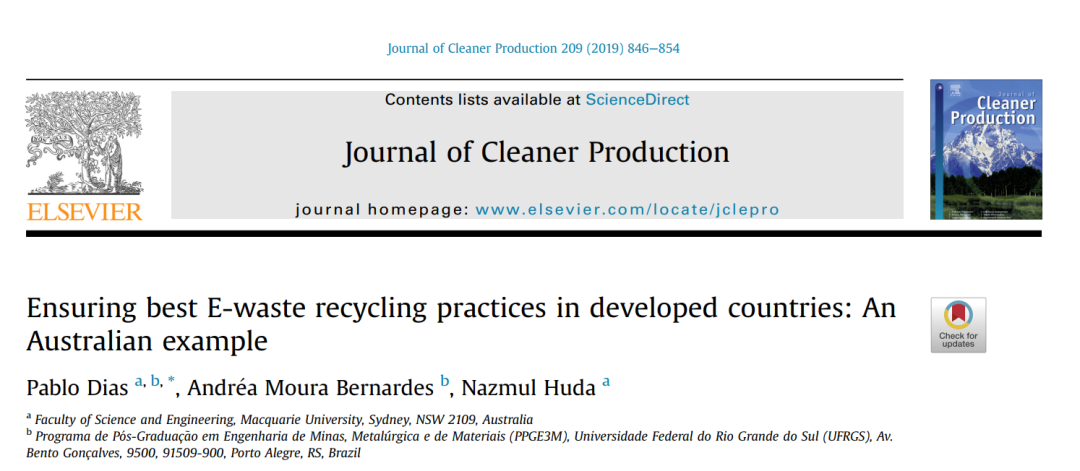
发达国家确保回收电子废弃物的最佳做法: 澳大利亚实例分析
文章发表于JCLP期刊 Volume209, 1 February 2019, Pages 846-854
链接:https://doi.org/10.1016/j.jclepro.2018.10.306
文章导读
随着人口的迅速增长,人类对可持续资源的需求逐渐增大。人们的目光逐渐转移到电子废弃物上来,它含有高价值的材料,如铜、金、稀土等,但同时也含有有毒物质,如汞、溴化阻燃剂等。倘若不加监管地任由市场直接回收电子废弃物,则不仅存在其蕴含价值不足以支撑企业运营的问题,还容易造成环境污染。因此,一些发达国家,包括法国、日本、德国等,都引入了回收系统和监管框架来管理电子废弃物的回收过程。同时,向发展中国家跨境转运是发达国家处理电子废弃物的一大重要途径,但这对发展中国家的环境造成了恶劣的影响。本研究以澳大利亚为例,探讨了发达国家确保回收电子废弃物的最佳做法,以期在环境友好的基础上最大限度地回收资源。
文章摘要

ABSTRACT
电子废弃物管理是21世纪面临的重大挑战之一,因为全球电子废弃物产量急剧增加,并且它们同时具有成为有价值材料来源和有害物质污染源的潜力。本研究以澳大利亚的回收计划为例,讨论了电子废弃物的管理。对实际回收过程的调查和相关的成本分析为决定哪些设备(或材料)将被出口或在国内被回收的决策过程提供了重要的依据。结果表明,废弃电脑是唯一具有足够内在价值的设备,可以在不需要任何外部补贴的情况下在国内进行回收。此外,本研究还讨论了这种补贴的重要性、规定和监督,主要是针对比废弃电脑内在价值小的电子废弃物。结果显示,在澳大利亚第一阶段的回收成本中,劳动力花费占90%以上,可以推断是由澳大利亚这种国家高昂的劳动力成本造成的。最后,本研究为鼓励在国际上更好地监督回收过程和(或)在发达国家促进下游回收过程提供了依据,以期促进全球实现更好的废弃物管理。
原文信息
The waste electrical and electronic equipment (e-waste) management is one of the great challenges faced in the twenty-first century due to the steep e-waste increase worldwide and their potential to be both a source of valuable materials and a hazardous source of contamination. In this study, the management of e-waste is discussed having the Australian recycling scheme as an example. The investigation on the actual recycling process and the associated cost analysis revealed important outcomes for the decision-making process of determining which equipment (or materials) will be exported and which will be recycled domestically. It is shown that scrap computers are the only equipment with enough intrinsic value to justify the domestic recycling without requiring any external subsidy. Furthermore, the importance of such subsidy, of regulations and monitoring are discussed, principally for e-waste with an intrinsic value smaller than computers. The results indicate that labor accounts for more than 90% of the cost of firststage recycling in Australia, which can be extrapolated to countries where labor is expensive. Finally, in the interest of achieving a better waste management worldwide, this study provides arguments to encourage a better monitoring of the recycling processes undertaken internationally and /or the promotion of downstream recycling processes in developed countries.
Keywords
Electronic waste; Recycling; Recycling cost; Waste management; WEEE management
Dias, P., Bernardes, A. M., Huda, N., 2019. Ensuring best E-waste recycling practices in developed countries: An Australian example. J. Clean. Prod., 209, 846-854.
